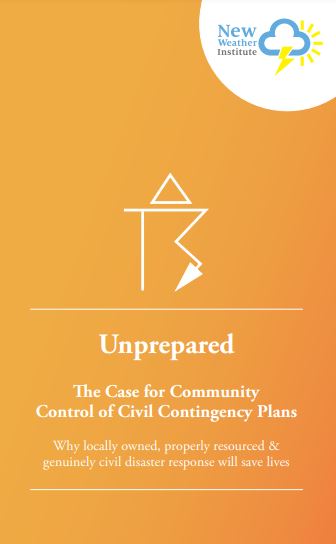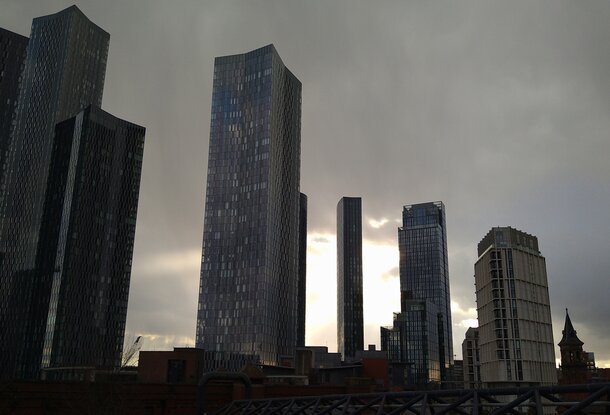Lindsay Mackie introduces New Weather’s new pamphlet, Unprepared, co-authored with David Boyle and Andrew Simms, which argues that an age of climate disasters and system vulnerability needs a dynamic, new, locally run approach to preparedness and response
If there were to be a disaster tomorrow – unprecedented floods, or a gigantic failure of the banking system, or a nationwide electrical outage or a new and vicious pandemic – how prepared are you?
Do you have a food store, battery radio, candles and matches, a First Aid kit? If you have a baby do you have a good supply of sterile water, baby food, disinfectants? Looking outwards, do you know who your vulnerable neighbours are? Do you know where the nearest community space on high ground is? Are there any local premises where food can be cooked? Are you a member of a local group – Scouts, Church, sport, choir, Food Bank, yoga, book group, Red Cross- which could be the core of a support network?
In countries like the UK local authorities and national government frequently flounder in the face of shocks, that might seem to be surprises, yet are largely predictable
The answer to many of these questions will probably be no. But you won’t be alone. In some places in the world, such as small, remote islands in climate disaster prone areas like the South Pacific, such preparedness, constantly rehearsed, is part of everyday life. The opposite is true in countries like the UK where local authorities and national government frequently flounder in the face of shocks, that might seem to be surprises, yet are largely predictable. And, with increasingly extreme weather coming to us all, and the systems we rely on from banking to food and energy supply lines becoming increasingly vulnerable, we think we need to turn that ‘no’ answer, into a ‘yes’.

But first, a quick look at what the Government is doing to help its citizens be as resilient and prepared as possible for the possibility of catastrophe, of one kind or another.
This will be a short section but it is an important one. Because disaster response around the world has identified that the best way to minimise damage from external shocks and to hasten recovery – is to maximise the capacity and agency of communities beforehand to face them.
In 1953 the worst floods that the UK had ever faced occurred in the East and South of England. Over 300 died and thousands of homes, businesses and infrastructure were destroyed. The cause was a huge North Sea tidal surge.
National warning systems were not as sophisticated as they are today – no internet, no 24 hour news, no social media. But what the country did have was a dense social fabric. Almost everyone in East Anglia, the worst affected area, it appeared, was a member of something. These voluntary, local, connected networks kicked into action – both rescuing people during the floods, and helping them afterwards.
The difference now is not that these small organisations have disappeared, or that they are somehow less effective – quite the reverse – but their existence is somehow taken for granted by the authorities, and in a time where savage politically motivated cuts have further undermined the ability of local government to provide essential services.
Many former small community based groups are the kind of organisations that have either been swallowed up by big charitable agencies or have failed to jump through the hoops required by the Big Lottery funder and its predecessors. Often, they have simply disappeared.
The localism debate tends to be dominated by arguments about democracy, and occasionally – though rarely – by arguments about economics. Yet the critical spine of an effective localism is the continued existence of local institutions and the local human relationships that hold them together, largely autonomous, that are an insurance policy that paid off that night sixty years ago and but still need to be nurtured.
The Government shows no signs of recognising the crucial nature of local, social and sociable groups. If it had trusted ordinary people active in their communities to underpin the public health policies during Covid, our test and trace procedures would have been a great deal more effective and vastly less expensive.
But even with its own national policies the Government – both the present one and the last Labour administration- demonstrate a lack of interest in our preparedness for the next predictably unexpected crisis. The Civil Contingencies Act allowed for the formation of 42 Local Resilience Forums (LRF) across the UK but again these were intended to respond to crises rather than, crucially, prepare for them by encouraging and nurturing local networks which could spring into action in a timely manner as soon as crises occur.
But dust has settled on the the forums, made up mainly of statutory bodies (police, fire brigade, etc) together with utilities, Highways Agency, and voluntary groups (the Rotary Club, churches) have an extremely patchy record in even meeting up. National Government doesn’t seem to spend much time thinking about them – a Cabinet Office document on the role of LRFs was last updated in 2013. Recent official reports on the preparedness of both London and the UK more widely have found a striking state of unpreparedness that exposes the population and especially its more vulnerable members to ‘lethal risks’.
The argument we at the New Weather Institute have put into our new pamphlet, Unprepared: the case for community control of civil contingency plans, and the Cadence Roundtable group, would make in relation to what we might – in the face of intense climate breakdown – call disaster planning is as follows.
Ask the questions.
- In a disaster how would communities co-ordinate to protect the vulnerable and keep essential services and basic needs met?
- If we were choosing systems that were most resilient to shocks, how would our energy, food, housing, care and transport systems be different?
- How would these systems be owned and managed?
These questions of course have profound implications for local democracy, for our economic system, for the shape of local economies, for our care and medical services. But change is imperative. And it can be made. A shift to trusting local communities, to developing local COBRAs – though we prefer a more cooperative, less disturbing animal after which to name local groups, like Mongoose – not simply relying on the secret deliberations of a national COBRA, a recognition that the altruistic and social instincts of humankind start with a sense of belonging and commitment to community and place – these are the changes that will give us the best chance of coming through crises and breakdowns, together.














